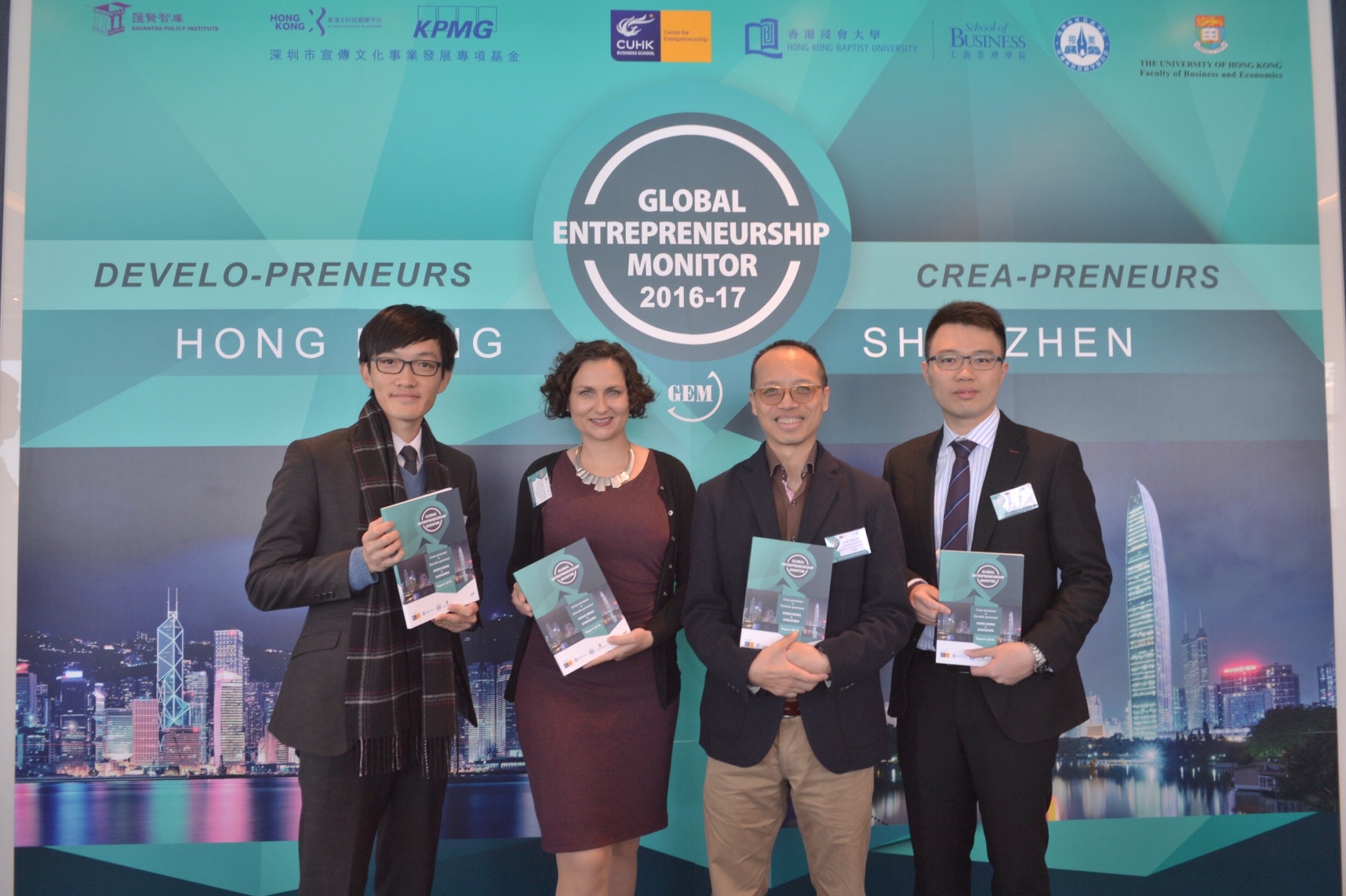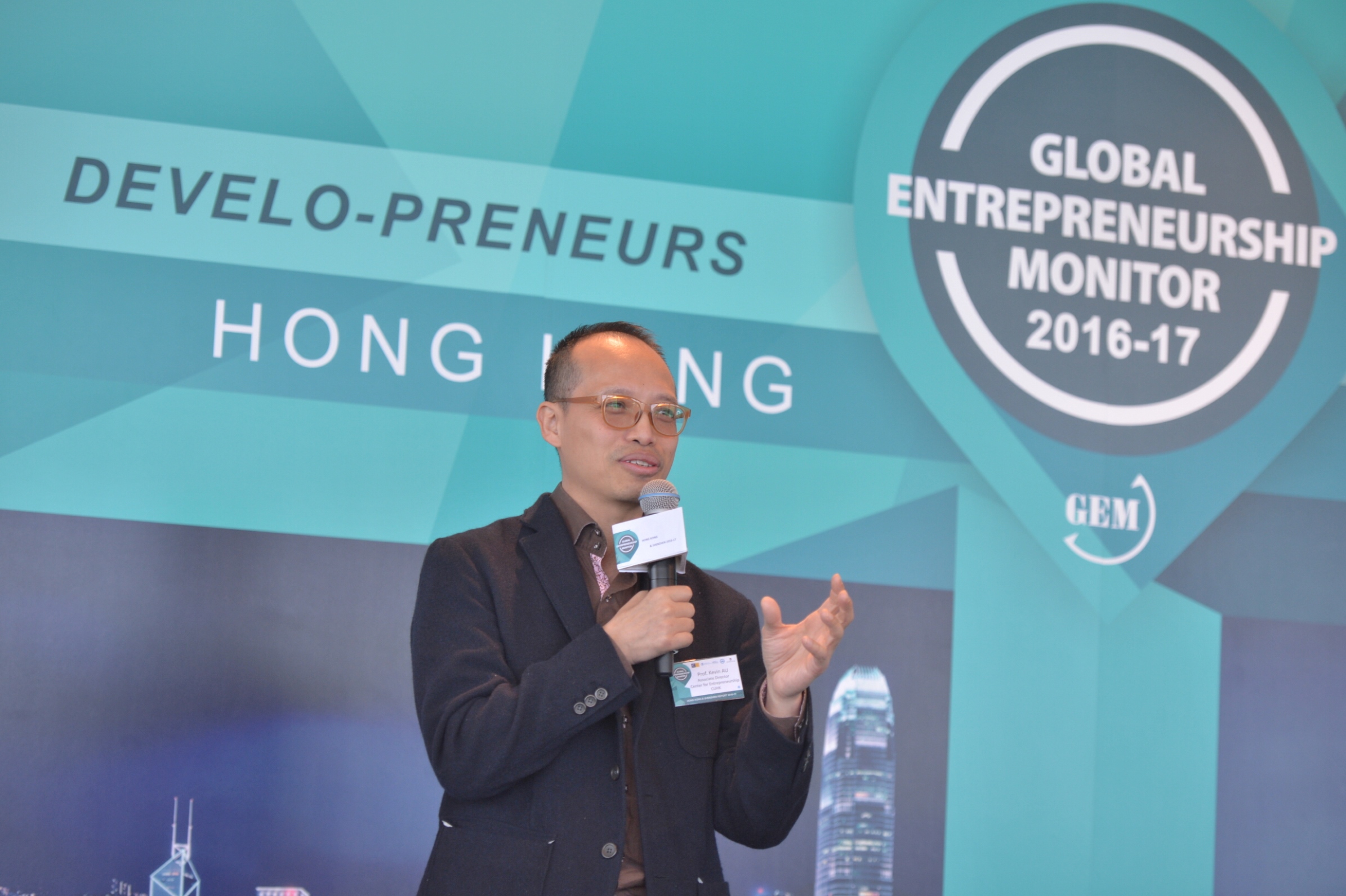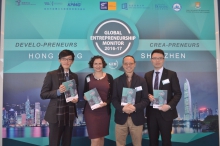CUHK
News Centre
Joint Entrepreneurship Study Shows Staggering Increase in Hong Kong and Shenzhen Entrepreneurial ActivitiesExperts advocate the two cities join force in formation of complementary advantages to foster international competitiveness
New research released today by the professors of The Chinese University of Hong Kong (CUHK) Business School’s Center for Entrepreneurship (CfE) and Hong Kong Baptist University (HKBU)’s School of Business shows that entrepreneurship in Hong Kong and Shenzhen is on the rise.
A collaborative effort by CUHK CfE, HKBU School of Business, the University of Hong Kong’s Faculty of Business and Economics, Shenzhen Academy of Social Science and Savantas Policy Research Institute, the research titled “Global Entrepreneurship Monitor (GEM) Hong Kong and Shenzhen Report 2016-17” provides a detailed analysis of the current status of entrepreneurship in Hong Kong and Shenzhen. The study compares the results with past indicators for both ecosystems and provides an international benchmark with 65 economies worldwide. It is part of the global initiative, Global Entrepreneurship Monitor (GEM), the world’s foremost comparative entrepreneurship study and a trusted resource on entrepreneurship for key international organizations such as the United Nations, World Economic Forum, World Bank and more.
In the recent few years, Hong Kong and Shenzhen have experienced an explosive growth in the start-up support ecosystem. The GEM Hong Kong and Shenzhen Report 2016-17 shows that the start-up rates recorded a staggering increase in Hong Kong and Shenzhen from 2009 to 2016. In mid-2016, the early-stage entrepreneurial activity among the adult population was estimated at 9.44 percent (3.64 percent in 2009) in Hong Kong and 16.04 percent (4.8 percent in 2009) in Shenzhen. The growth has been driven by a rapid increase in Shenzhen’s new* (+284 percent) and Hong Kong’s growth in nascent** businesses (+206 percent) in comparison with 2009 statistics. The prevalence rates of established businesses recorded an increase as well: +389 percent for Shenzhen and +109 percent for Hong Kong. It is worth noting that while entrepreneurship rates are on the rise in Hong Kong and Shenzhen, they are declining in other places in China. Both cities have developed a separate start-up culture and entrepreneurial ecosystem that operate independently from the rest of the Mainland.
The positive changes were not limited to early entrepreneurship rates only. The research team also observed a major shift in attitudes and entrepreneurial intentions. In particular, 56.8 percent of the adult population perceives start-up opportunities in Hong Kong. In Shenzhen, the same proportion of individuals who declared they possessed necessary skills and knowledge to start a new business (35.8 percent), also reported their intention to start a business in the next two years (36 percent). Comparing to 2009, the population with entrepreneurial intentions in Hong Kong grew from 7.3 percent to 19.7 percent in 2016, representing an impressive increase of +170 percent. Similarly, in Shenzhen the intentions grew from 17.6 percent to 36 percent, an increase of +105 percent. According to the study, cultural conditioning and attitudes towards entrepreneurship, perception of own skills, and exposure to entrepreneurship practices all had a positive impact on intentions to start businesses. Successful entrepreneurs are also regaining their high status and are promoted by local media in Shenzhen and Hong Kong.
In terms of financial support, Hong Kong early-stage firms have lower capital requirements than that of their Shenzhen counterparts, which may be related to the lower technological intensity of Hong Kong firms. 92 percent of nascent entrepreneurs in the two cities declared that their principal source of financial support was their own savings. The role of the family in financing new ventures is still significant in Shenzhen, but not so much in Hong Kong. Banks are also more supportive of startups in Shenzhen than in Hong Kong and so are venture capitalists, which could be explained by a higher prevalence of start-ups with profound market impact. In Hong Kong, on the other hand, crowdfunding is more prevalent as the source of capital for early-stage businesses, a sign of a more established product innovation.
Aligned with higher entrepreneurship rates, the research team also found a growing culture of informal investors developing in both cities. Shenzhen observed a much higher informal investment prevalence rate (20.5 percent) than Hong Kong (6.5 percent) of the adult population. In fact, Hong Kong and Shenzhen informal investors were two of the most generous among all economies in the study with a contribution of US$70,565 and US$76,112 respectively. The study has also recorded a dramatic change in investment patterns for Shenzhen. While in 2009 individuals were rather investing in family members, in 2016, friends and neighbors had been the first choice which was aligned with that of Hong Kong.
In addition, the research team interviewed 39 Hong Kong and 37 Shenzhen experts in the field of entrepreneurship about their opinions on how the cooperation between Hong Kong and Shenzhen that would increase the cities’ international competitiveness. The most frequent recommendation was to leverage the natural industry compatibilities between Hong Kong and Shenzhen. Other recommendations include:
- Joint development of industries such as Internet-of-Things, Smart City, Health Tech, Edu Tech, Fintech or E-commerce
- Joint R&D initiatives aiming at cross-border innovation, sharing of talents and intensification of knowledge exchange
- Introduction of joint or cross-border education to develop a shared cultural understanding of each other through opening more world-class academic institutions catering to students from both sides of the border
- Coordinating government policies for entrepreneurship between the two economies, e.g. joint visas for entrepreneurs that would facilitate cross-border operations of many start-ups
Prof. Kevin Au, Associate Director of CUHK CfE and Associate Professor of the Department of Management at CUHK Business School, says: “If Hong Kong and Shenzhen join forces in the formation of complementary advantages on entrepreneurship, it would strengthen the international and Mainland competitiveness for both. This can be the first step towards the development of the Hong Kong-Shenzhen megalopolis.”
Dr. Marta K. Dowejko, Research Assistant Professor in Entrepreneurship of the Department of Management at HKBU School of Business, says: “Hong Kong and Shenzhen are facing a fantastic opportunity: that of being in the perfect position to build a highly unique and internationally competitive start-up hub with an unparalleled ecosystem compatibility between the two cities and a supportive informal investment culture. While Shenzhen’s start-ups are well geared to deliver innovative ideas with high growth potential, Hong Kong’s entrepreneurs possess the know-how in taking ideas to the next level and ensuring their long-term sustainability. The results from this year’s GEM report give testament to this unique setup that no other place in the world has.”
* 3 to 42 months old businesses
** in the process of starting up, less than three months old
For other findings, please visit: https://goo.gl/zGfznP to read the full report. Please download the PowerPoint slides from: https://goo.gl/S4qB44 for reference.
About CUHK Business School
CUHK Business School comprises two schools – Accountancy and Hotel and Tourism Management – and four departments – Decision Sciences & Managerial Economics, Finance, Management and Marketing. Established in Hong Kong in 1963, it is the first business school to offer BBA, MBA and Executive MBA programs in the region. Today, the School offers 8 undergraduate programs and 13 graduate programs including MBA, EMBA, Master, MSc, MPhil and PhD.
In the Financial Times Global MBA Ranking 2017, CUHK MBA is ranked 36th. In FT‘s 2016 EMBA ranking, CUHK EMBA is ranked 37th in the world. CUHK Business School has the largest number of business alumni (32,000+) in Hong Kong – many of whom are key business leaders. The School currently has about 4,400 undergraduate and postgraduate students and Professor Kalok Chan is the Dean of CUHK Business School.
More information is available at: www.bschool.cuhk.edu.hk or by connecting with CUHK Business School on Facebook: www.facebook.com/cuhkbschool and LinkedIn: www.linkedin.com/company/cuhk-business-school.
About HKBU School of Business
Since 1956, HKBU School of Business has provided innovative business education to students from across the globe. We seek to inspire good business practice, create value for stakeholders, and enhance social and economic growth and development through our research on corporate sustainability issues, encompassing the areas of business ethics, corporate social responsibility and corporate governance.
About Faculty of Business and Economics, The University of Hong Kong
The Faculty of Business and Economics at The University of Hong Kong strives to nurture first-class business leaders and foster academic and relevant research to serve the needs of Hong Kong, China and the rest of the world in the new Asia-led economy. As Asia’s premier international business school, FBE engages leading scholars from all corners of the globe and they instil in the students global knowledge with an Asian perspective. The Faculty attracts top students from Hong Kong and beyond. It admits the highest proportion of non-local undergraduate students amongst all Faculties at HKU. Three of its undergraduate programmes are ranked among the University’s top 10 programmes.
The Faculty’s full-time MBA programme has a strong Asia and China focus, and the programme has been ranked Asia’s no. 1 in the World MBA Rankings released by the Economist Intelligence Unit (EIU) for seven consecutive years from 2010 to 2016. Students can opt for an overseas exchange opportunity to supplement their campus learning in Hong Kong: a London track at London Business School, a New York track at Columbia Business School or a Hong Kong/China track at Fudan University.
The Faculty also offers an elite EMBA Global Asia programme, jointly with CBS and LBS, for globally-focused senior executives and professionals. Its International MBA Programme, delivered in Shanghai in collaboration with Fudan University, was the first of its kind when it was launched in 1998.
FBE is fully accredited by the European Quality Improvement Systems (EQUIS). Its accounting and business programmes are also accredited by the Association to Advance Collegiate Schools of Business (AACSB).
Additional Information: www.fbe.hku.hk
Facebook: https://www.facebook.com/hkubusinesseconomicsfaculty
Weibo: http://www.weibo.com/hkufbe
LinkedIn: https://www.linkedin.com/groups/5013122
About the Shenzhen Academy of Social Science
Established in July 1992, the Shenzhen Academy of Social Science (SZASS) is a subordinate unit of the Shenzhen Municipal People’s Government. SZASS is a research institute of philosophy and social science, consisting of five research units: economy, social development, culture, political science and law, and international urban studies.
More information is available at: www.szass.com.
From right to left: Dr. Allen Yu, Co-Founder and Genetic Scientist of CodeX Genetics; Prof. Kevin Au, Associate Director of CUHK CfE and Associate Professor of the Department of Management at CUHK Business School; Dr. Marta K. Dowejko, Research Assistant Professor in Entrepreneurship of the Department of Management at HKBU School of Business; and Mr. Sam Chong, Founder of Easy Green





